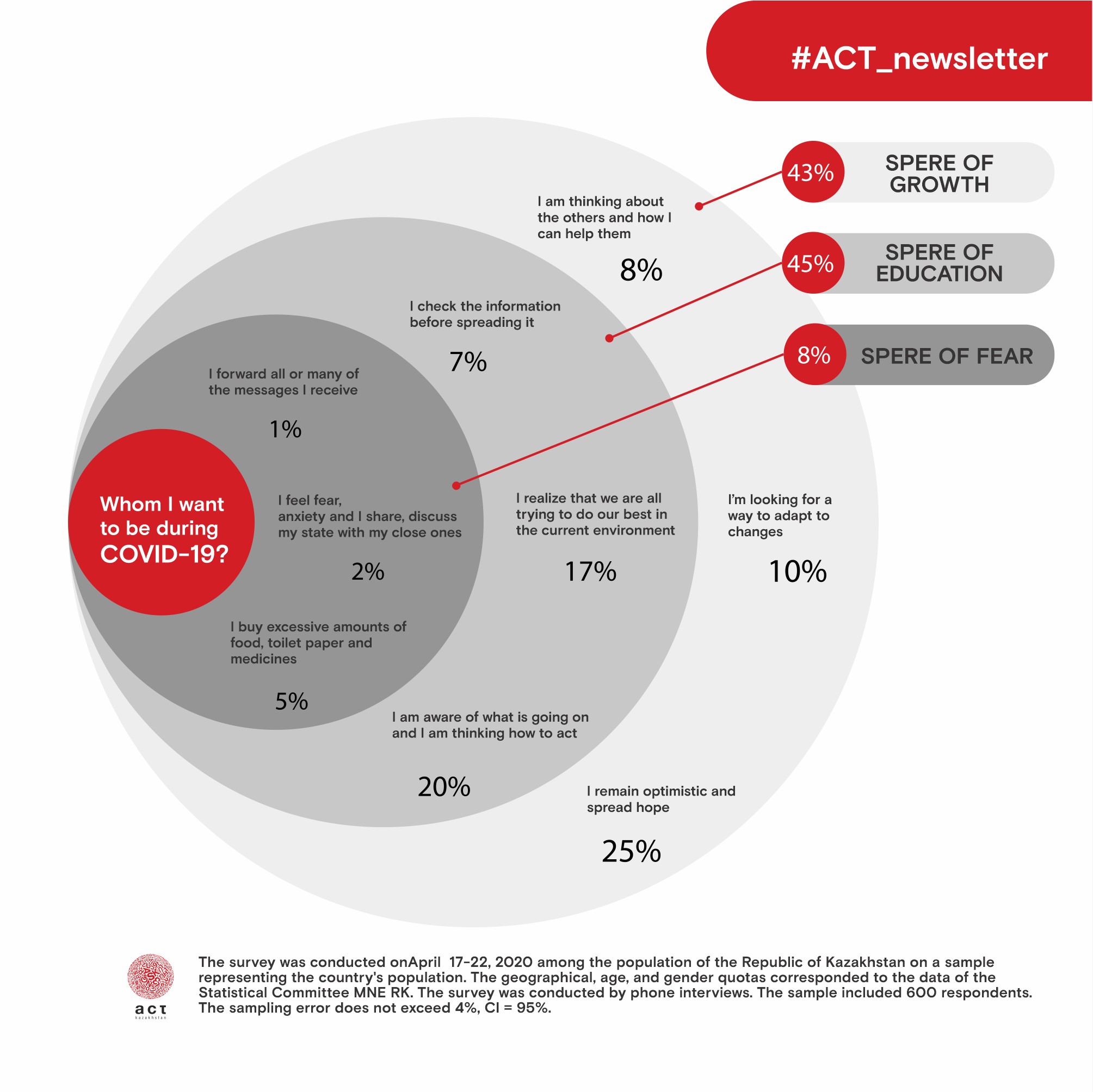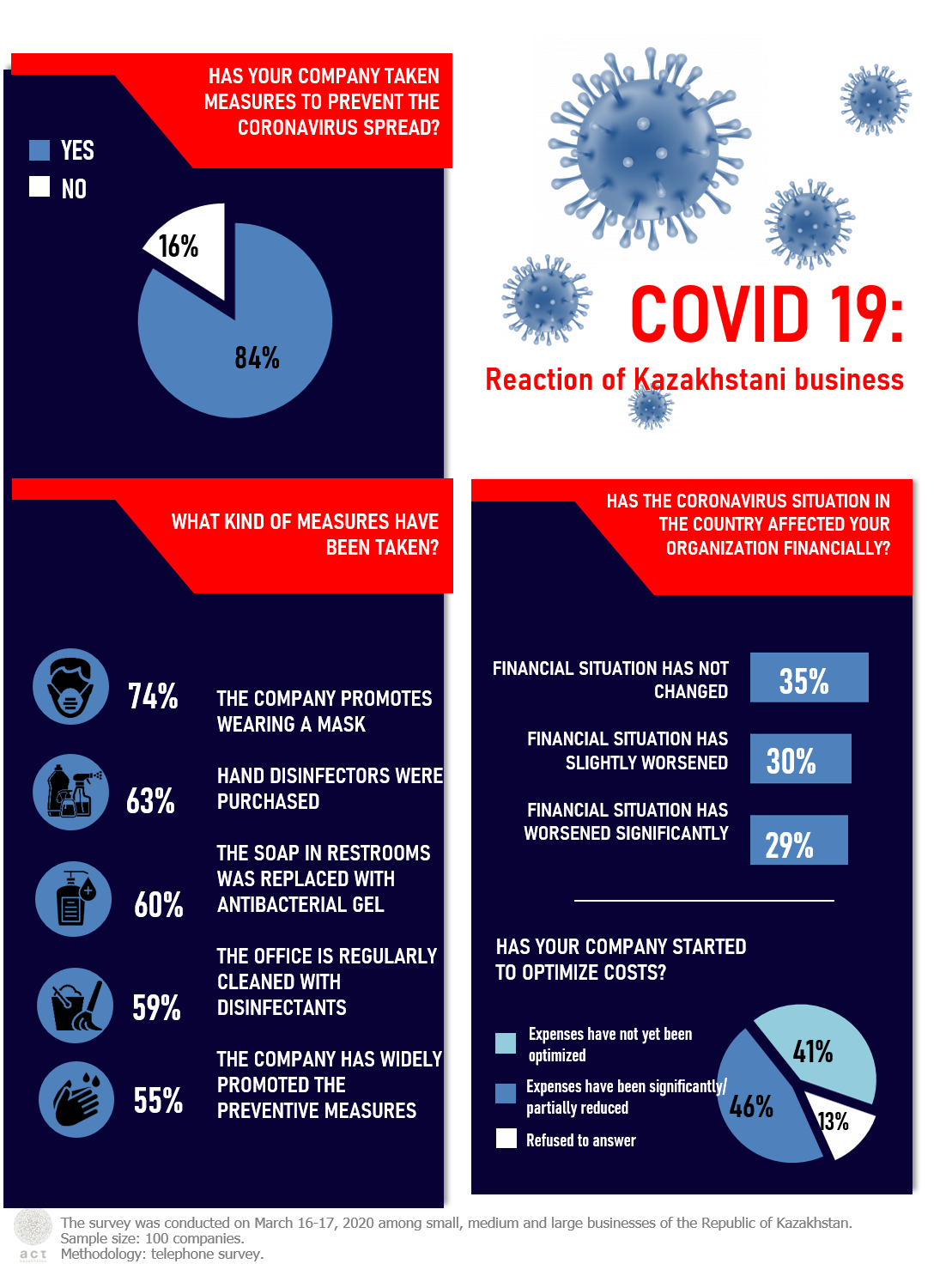




During the quarantine, one could come across many recommendations from specialists, psychologists, coaches, opinion leaders, and ordinary people on how to cope with stress and fears brought by the COVID-19 pandemic.In that information flow, we paid attention to a very interesting infographic (https://clck.ru/NCBxg ) by Robert L. Leahy, Doctor of Psychology. This infographic is convenient for self-diagnostics. It will help you to see which sphere you are in: the sphere of fear, education, or growth! This scheme also supports tracking the movement from one sphere to another, depending on various internal and external circumstances.
Our curiosity turned into interest. Who we, the Kazakhstanis, are during COVID-19? We’ve transformed the scheme into a question with possible variants of answers, adapted it to a data collection methodology, and asked Kazakhstanis the following question: “How yould you describe your style of behaviour during the COVID-19 pandemic? Choose one variant of the answer which provides the closest description of your behavior in the current conditions.”
The results should be reviewed in the context of a certain time period of collecting data, since, as we mentioned before, a person can move from one sphere to another.According to our measurements, on 17-22 April 2020, most of the Kazakhstanis (45%) were in the sphere of education, 43% tended for the behavior typical for the sphere of growth, 8% have found themselves in the sphere of fear, and 4% found it difficult to answer.

Back in March 2020, we started discussing with our constant client conducting an in-hall test of soft drinks. The primary purpose was to test the tastes and properties of the drinks with existing and updated formulation to assess the potential for a market launch of a refreshed soft drink. The project involved tight timing for the very test stage – the second decade of April 2020. The emergency was not declared yet at that moment, but we had a feeling that the respondents became all less and less accessible for a personal interview. Then we started thinking about possible variants in the case the emergency was declared, and quarantine introduced.
Since it has actually happened, our wish to modify our procedures just strengthened. From the first day of the quarantine, we have already been working remotely in terms of conducting telephone surveys (you can read about this here: https://clck.ru/Mq9Fu ). It only gave us confidence that anything was possible, and we might propose a product with a known methodology in a refreshed format! Here, we should emphasize the interest, involvement, and desire to help us on the part of our client. We are immensely grateful to him for his trust and challenge that led to a fruitful result for both parties, Group brainstorming helped us analyze all the possible subtleties of the methodology that we planned to translate into an online format, as well as to identify potential difficulties and draw up a detailed work plan. The most struggling issue was ensuring personal safety and compliance with the recommended sanitary measures by all project participants (ACT employees and respondents). The following stages were implemented, keeping in mind the safety and compliance aspects.
Preparation of guidance materials:
Details about recruiting of respondents:
Online-purchase/delivery of products for conducting the in-hall test:
Technical support:
The sample size was 100 respondents. The data was collected on April 10-13, 2020. The obtained experience of conducting an in-hall test during quarantine allowed us to improve and hone all the workflows necessary to conduct this kind of research. We will be glad to assist you in doing marketing research during quarantine, as well as any other time!
The COVID-19 epidemic starting late in 2019 has already had a significant impact on both the daily lives of each of us and the business environment. ACT is an integral part of the business environment of the countries where the company operates. The ACT Kazakhstan team decided to assess the current impact the coronavirus pandemic is having on business, to find out which decisions the leaders of Kazakhstani companies make to prevent the virus spread, what is the effect of current instability on the companies’ financial activities, as well as to check the general mood in the companies.
On 16-17 March 2020, we made a telephone survey involving 100 representatives of the TOP-management of Kazakhstani companies. Kazakhstani companies rated the overall level of internal unrest/fear in companies due to the spread of coronavirus in the world at 4.03 points on a 10-point scale (“0” – “No disturbance,” “10” – “Very high level of unrest/fear”). Only 4% of Kazakhstani companies assessed the level of unrest/fear in the company as “very high.”
According to the survey, 84% of organizations have taken some measures to prevent the virus spread. Such measures included the propaganda of wearing medical masks, their centralized procurement and distribution among the employees (74%), purchasing disinfectants for hand washing (60%) and disinfection (63%), as well as strengthening the office and workplace disinfection (59%). It is worth noting that 55% of companies actively discuss and disseminate information about preventive personal hygiene measures during the pandemic. 58% of companies noted significant (25%) or partial (33%) changes in daily work processes due to the coronavirus situation in the country.
A complete list of changes in the processes that Kazakhstani enterprises have already encountered is as follows:
In addition to changes in work processes, 59% of company representatives noted that the coronavirus situation in the country has started influencing the corporate finances (the financial situation has slightly worsened in 30% of cases and significantly worsened in 29% of cases). SMEs were mostly affected financially. 35% of organizations maintain a stable financial standing.46% of the companies noted they are revising the expenditure side of the budget due to the current situation.
The survey was conducted on 16-17 March 2020 among small, medium, and large businesses of the Republic of Kazakhstan. Sample size: 100 companies. Methodology: a telephone survey. The use of survey materials is permitted with the obligatory mention of the survey’s author.
